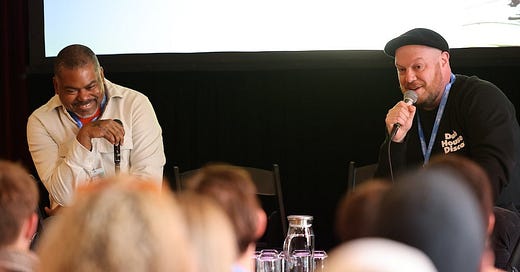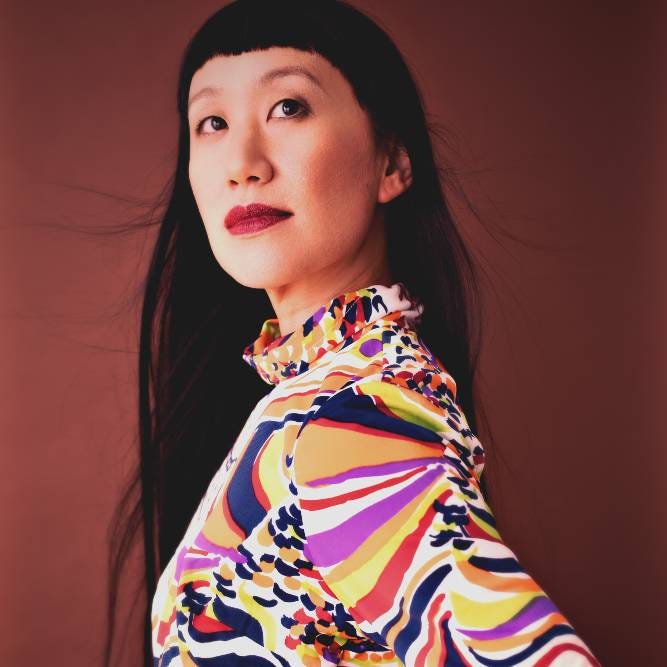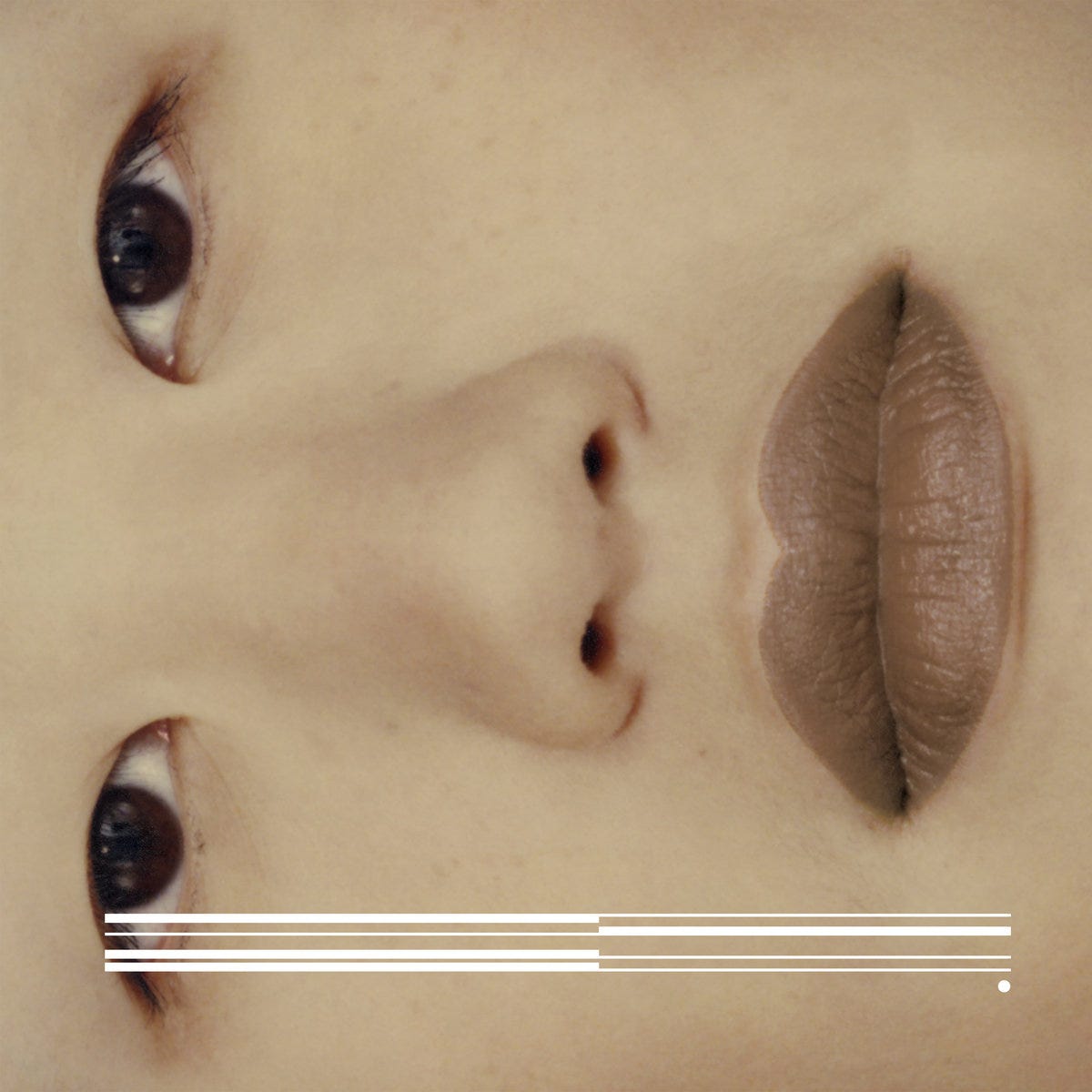Selected Works is a weekly (usually) newsletter by the Te Whanganui-a-Tara, Aotearoa (Wellington, New Zealand) based freelance music journalist, broadcaster, copywriter and sometimes DJ Martyn Pepperell, aka Yours Truly. Most weeks, Selected Works consists of a recap of what I’ve been doing lately and some of what I’ve been listening to and reading, paired with film photographs I’ve taken + some bonuses. All of that said, sometimes it takes completely different forms.
WHAT I’VE BEEN DOING:
On Friday, I hosted the keynote conversation at Going Global, an annual music industry seminar organised by Independent Music New Zealand. My interviewee was a very esteemed gentleman named Che Pope from Wrkshp Inc and Distrokid. Depending on how deep you go into details, you might know his production work from The Miseducation of Lauryn Hill, some of Dr Dre’s early 2000s work, or Kanye West’s Good Music. Anyway, I don’t want to give it all away. We start around 45 mins into the video below.
At 5 pm Bethlehem time on Monday the 29th of August, Palestine’s Radio Alhara راديو الحارة broadcast my latest mixshow presentation for them. Clocking in at just under sixty minutes, In Full Swing is a collection of new jack swing, swingbeat and street soul records recorded around the world during the nineties. Countries represented include Australia, France, New Zealand, Japan, and the UK. You can listen to the archive recording over on Mixcloud here.
WHAT I’VE BEEN READING:
The many lives of Lindah Lepou, NZ’s inaugural queer arts laureate: The multidimensional fa’afafine artist has created art to bridge her many identities – and to survive. Nearing 50, and more at peace with her life, receiving The Arts Foundation’s first queer laureate award feels right. Reweti Kohere for The Spinoff.
Delirious Tempos, Viral Dances, and Hometown Pride—Welcome to the Next Generation of Club Rap: Young artists in Newark, New Jersey and Philadelphia are injecting kinetic, dance-friendly tempos into their tracks, paying tribute to their cities’ club legacies while offering a sound all their own. Alphonse Pierre for Pitchfork.
Letter to my Unfinished Manuscript: Vanessa Mei Crofskey writes a letter to their unwritten manuscript and dwells on the way Western notions of time, plus the pandemic, have affected their relationship to productivity and success. For The Pantograph Punch.
Marseille's Clubbing Scene Remains Shrouded in Mystery: Following billion euro revitalisation efforts, the multicultural city has become an attractive hub for investors. But unlike its crowded local beaches, Marseille's electronic underground remains relatively untouched. Marie Dapoigny for Resident Advisor.
WHAT I’VE BEEN LISTENING TO:
In light of the forthcoming American Dream Reserve and Ghost Riders compilations on Smiling C and Efficient Space respectively, I’ve found myself compelled to revisit Donnie & Joe Emerson’s Dreaming Wild album. I swear there was a period in the mid-2010s where their record never left my DJ bag. ‘Baby’ always goes down a treat, but I’m rather partial to ‘Good Time’ as well. Soulful psych rock excellence from rural Washington State in the US.
Along a similar line of logic, I’ve also found myself revisiting the works of the San Francisco-based late 80s lo-fi funk rock artist Doug Hream Blunt. I first found his work in the early 2010s by googling “Dam Funk Ariel Pink Remix” and managed to quickly score a couple of 12”s of his and a CD. Years later, Luaka Bop put together this excellent compilation album of Doug’s work. About six months later, I finally got to see him perform live at London’s Field Day festival. I’ve interviewed Doug a couple of times over the years. He’s a lovely man.
The great Karen Nyame KG dropped a new single last week for Bandcamp Friday, and I can’t stop listening to it. Sitting at the intersection of Amapiano, Afro-House and Afrobeat, ‘Taboo’ showcases KG’s effortless production skills and abilities as a vocalist to full effect. In her words, ’Taboo’ is a sensuous, Afro groove-inspired, mystical take on forbidden love, I veer towards it anyways despite opposition. This is me being me. A celebration of existing loudly.” DJs, there’s an acapella and an instrumental as well!
Jitwam, co-founder of interdisciplinary creative project Chalo and the Jazz Diaries label, takes us on a “psychedelic journey through the sounds of the motherland” for Crack Magazine with their latest Sunday Mix. This one’s dubbed ‘BOLLYFUNK’.
In his words, “I wanted to show how revolutionary and forward-thinking Indian thought and sounds have been, and their impact on music over the years… Only in India can you find the first recorded documents of drum machines synced with synthesisers, big brass over the sounds of a burning train, traditional melodies and ragas over the sounds of some funky ass breakbeats.”
A SEAMING TO INTERVIEW:
A few weeks ago, Alec from Lo Recordings sent me an email to let me know how much he enjoyed the Susumu Yokota retrospective feature I put together with Ken Hidaka for Wax Poetics last year. At the end of the email, he mentioned one of their UK artists, Seaming To, had a new EP out with a reworking of ‘The Natural Process’ by Yokota-san on it. You know I had to check that out. After listening to To’s Natural Process EP, I requested an interview with her, which we eventually conducted via zoom while she was on holiday in Mallorca. You can read it below.
In the late 90s, Seaming To relocated from her hometown of London to Manchester to study at the Royal Northern College of Music. There, she connected with two crucial musicians, Paddy Steer of Homelife and 808 State’s Graham Massey, opening her up to a world that allowed her to develop as a composer, vocalist, multi-instrumentalist and producer. In time, To’s work with Steer and Graham brought her onto the radar of early 21st century UK music luminaries, including Mr Scruff, Cinematic Orchestra, The Herbaliser, Leila and Soft Machine’s Robert Wyatt, while also forming the Mayming duo with Semay Wu. In 2012, she released her debut album, Seaming. An enchantingly cinematic blend of chamber pop, avant-garde composition, modern classical and electronica, it found a home on the LUMIN label. A decade later, she’s back with a new EP release for Lo Recording, Natural Process.
Seaming To: It was recently pointed out to me that the last time I released a solo thing was ten years ago, which shocked me really. I’ve kind of been making music over the last ten years, I just haven’t released anything, but there is going to be quite a big output soon. I’ve been busy cultivating babies. I’ve got two children now. My first child was born a year after my last release, so you can probably see the trajectory [laughs].
Martyn Pepperell: If we rewind things ten years, when I was researching you, part of the media narrative I noticed is that you were breaking tradition from a lineage of concert pianists.
Seaming To: Pretty much. I am a bit of a black sheep in my family anyway. But yeah, breaking tradition away from all the pianists. My gran started it all. She studied at the first conservatory in Shanghai. She studied with [Hungarian piano virtuoso] Franz Liszt’s pupil’s pupil. Fast forward fifty years, and I was very much influenced by my mother, of all the pianists in my family. I’ve got two aunts, my mum, my dad and my sister all studied piano. My mum, my grandma and my husband are pianists as well.
Martyn Pepperell: Just melodies and chords everywhere.
Seaming To: At music college in Manchester, I met the wonderful Paddy Steer, joined his band Homelife, and we released many wonderful albums on Ninja Tune. I also met Graham Massey from 808 State. After that, I veered away from classical music. I’d always been lurking in dark alleys and interested in non-classical stuff, but they really showed me the light [laughs].
Martyn Pepperell: What was living in Manchester like?
Seaming To: It’s a lot easier to get to meet and work with these creative dudes living in Manchester than it is in London. I was really fortunate to meet them. It all started off with Paddy looking for a singer for Homelife. Graham is in Homelife as well. It’s sort of like a Venn diagram where half the members of Homelife are in Graham Massey’s Toolshed as well. Through these two dudes, I met all of these other musicians as well, and they were all doing completely different sort of styles of music. It was a big pot of rich different styles. There were also great record shops in Manchester. There’s a place called Kingbee Records in Chorlton, Manchester, where I lived. Quite often, Graham and I would go down there and listen to loads of music. I got quite a lot of early ‘90s rave vinyl there.
Martyn Pepperell: It’s been ten years since you released your first album, Seaming. When you think back on it, what were your aims with it?
Seaming To: I don’t think I even had an aim with it, really. A lot of those songs were recorded at home. They kind of just came from me being playful where there are happy accidents, or sometimes it’s just when the urge arises. A lot of it was born out of improvisation, and I don’t know what I was doing. But I will go on and on until I’m happy. The process does become more refined, but I’m not sure what I’m doing in the beginning. I love recording myself at home as opposed to being in the studio because I need it to be an exact thing. Although, sometimes that is to my detriment because I have had friends or my husband say, you know, that first take was the one. In fact, when I recorded with Robert Wyatt for his album, I did two different versions in the studio with him. He actually liked the messy, raw one, as did Brian Eno, who was also on the track. Whereas I liked the one that I had sort of worked on. And he went with that. He was so kind, even though it was his album, but maybe I should have listened to Robert Wyatt.
Martyn Pepperell: How does it feel to be releasing solo music projects again?
Seaming To: I’m happier in my own skin now. It’s just a case of doing it and putting more stuff out. As to whether it fits in now or not, I can only keep making music. I can’t even try to pigeonhole it anymore.
Martyn Pepperell: The first track on your new EP Natural Process is a rework of a Susumu Yokota song. What’s your relationship with his music?
Seaming To: Well, I first discovered it through friends of mine, having sort of travelled, and visited London a lot in the early 2000s. Mostly partying at the clubs, clubbing, coming home, and kind of watching the sunrise and listening to Susumu Yokota, mainly The Boy And The Tree, Sakura, and Grinning Cat. They're just so full of atmosphere, ambience and kind of nostalgia and yeah, beautifully produced and really carefully combining classical with his use of samples.
Anyway, fast forwarding to 2019 and John Tye [from Lo Recordings], who I think has always liked Homelife. He got in touch with me and said he was putting together a concert at the Union Chapel in London in October 2019. He was looking for musicians to kind of recreate or perform Yokota's music. He asked if I would, out of all the albums, listen to them and work out which one I wanted to perform live or express in my own way. And then it was 'The Natural Process', which was the one that I wanted to do. Out of that was a recording, and then they said they wanted to put it out.
Martyn Pepperell: That became the first track on your Natural Process EP. It’s followed by a choral piece titled ‘proneandsupine’, and then there is an extract from a larger work called ‘Test Patterns’ as well.
Seaming To: Yeah, so Victoria Keddie. She’s an artist and filmmaker based in New York, but she also produces her own music. We were kind of put together for this film music event by Video Jam, who are based in Manchester. The idea was to bring together musicians and filmmakers who have never worked together and have them collaborate. She presented this film called Test Patterns, and I made music to it. It was such a beautiful film to work with, sort of exploring the analog world from the inside out. I think that is what she says about it. It was a triptych, a three-screen thing, and I performed it live. I used lots of my analog synths to try to match her analog visual language. I basically took a snippet from that and put it on the B-side. I wanted to reflect my synthesised music.
Martyn Pepperell: In a sense, this EP is like an introduction but also a demonstration of the different things you can do.
Seaming To: Yeah, I guess it probably is a reintroduction. It’s been a while. For the last kind of six or seven years, I've been collaborating with various people who've been making short films. We’ve either performed them live, or they’ve been shown. I’ve always loved working with moving images and dance. I might try to release some of my soundtracks.
Natural Process by Seaming To is out now through Lo Recordings (order here)
FIN.







